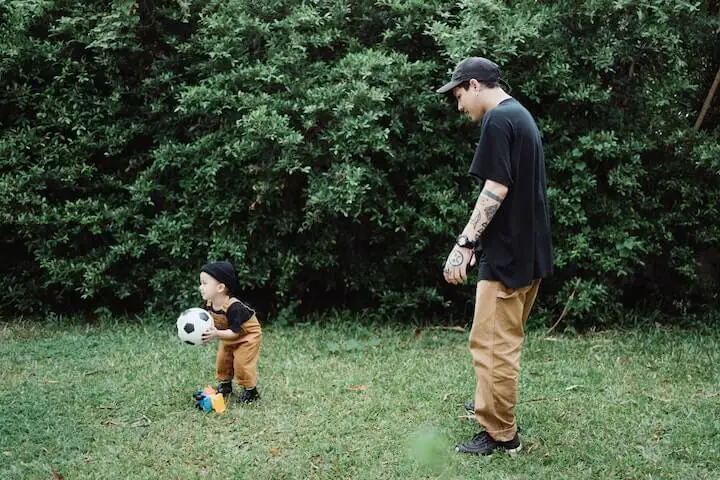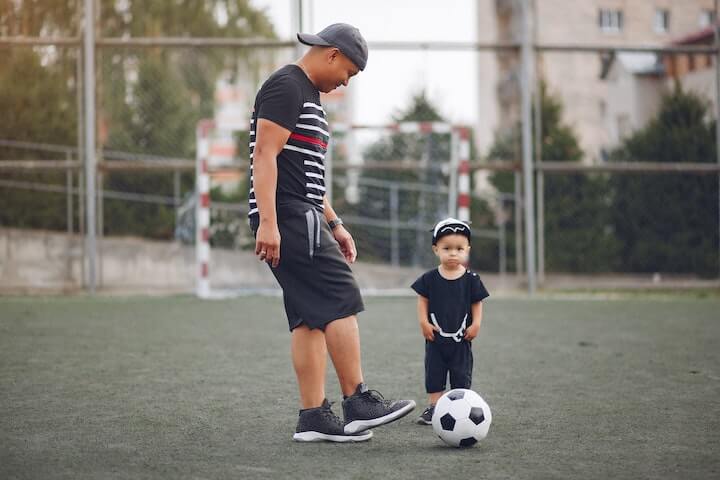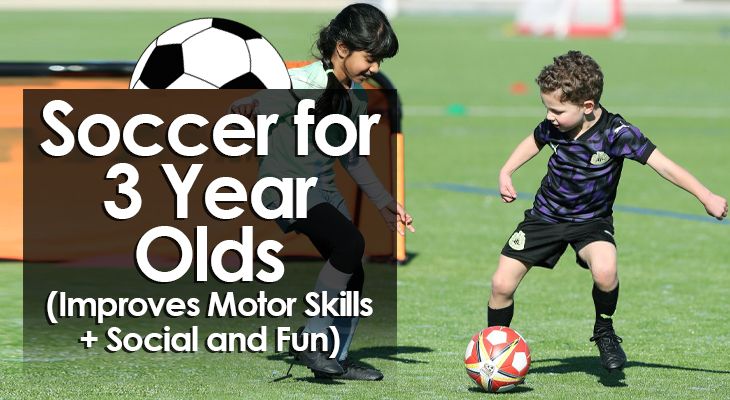Soccer for 3-Year-Olds (Improve Motor Skills and Have Fun)
If your toddler spends the day running around the house, jumping between sofas, and tumbling on the carpet, you may be looking for healthy ways to channel their energy.
At 3-years-old, many parents question whether it’s appropriate to introduce their child to sports.
We’ve all heard stories from pro athletes’ parents, claiming their children demonstrated capacity for sports as soon as they left the womb...
But this isn’t the case for most, so it’s important do what’s right for your toddler.
If your 3-year-old shows an interest in soccer and has the physical ability to run, jump, catch, or kick, it can be a fantastic outlet for skill development, socializing, and having fun.
Is Soccer for 3-Year-Olds Appropriate?
Compared to many other sports -- like basketball, baseball, tennis, etc -- soccer is very simple.
There's a ball and a goal, and the player’s job is to kick the ball into said goal.
Easy, right?
Despite its simplicity, soccer requires coordination, balance, motor skills, and a basic idea of the objective -- each of which your 3-year-old is likely developing on a daily basis.
In my opinion, soccer is a wonderful way to support the physical, cognitive, and emotional development of a young child.
It’s also an opportunistic method for introducing your toddler to fitness in a fun and healthy way, especially if you get involved.

Start Slow and Exercise Patience
First of all, it's important to note that most 3-year-old kids aren’t necessarily ready to participate in sports that involve competition.
In fact, According to the American Academy of Pediatrics (AAP), most children under the age of 6 don’t have the necessary motor skills to engage in organized sports at all.
Therefore, introducing soccer to your child IS NOT about developing a win-or-die attitude.
The focus should be on instilling healthy habits and providing your child with physical and social skills that will benefit them as they get older.
View soccer as active play rather than a sport and watch your child blossom.
Benefits of Soccer for 3-Year-Olds
After deciding that your son or daughter is ready to start kicking a ball around your backyard...
Learning the main benefits of soccer for 3-year-olds will help you create an optimal environment for learning and fun.
Before starting them on their soccer journey, remember that learning the rules, positions, and tactics will come with age.
At 3-years old, young players should just be working on their fine motor skills and overall physical development.
If they get the opportunity to play with others, there are even more advantages to playing soccer.
Here are the key benefits of soccer for 3-year-olds.
#1 - Builds Motor Skills
Motor skills are those that enable the body to move and perform different everyday tasks, like picking something up.
Fine motor skills, such as writing or dribbling a soccer ball, involve more precision and typically require more refinement of smaller muscles.
Finally, gross motor skills trigger your body’s major muscle groups and enable the body to balance, jump, run, or react quickly.
Although people develop motor skills naturally with age, their brains must stimulate these skills for optimum function.
Playing soccer involves a multitude of athletic movements, like running, kicking, dribbling, and throwing.
The repetition of these skills aids the conscious stimulation of the muscle groups, which can improve your child’s ability to make these essential movements.
#2 - Accelerates Cognitive Development
Kicking a soccer ball around, whether passing to a teammate or shooting on goal, is essentially problem-solving.
It requires spatial awareness, target fixation, and foot-eye coordination.
Each of these factors can accelerate cognitive development through focus and attention.
Scoring a goal or making a successful pass also helps your child to recognize and overcome challenges -- which can be applied to other aspects of life, like school or home tasks.
Learning to track the movement of the ball and navigate the field teaches children to think and react quickly, creating a stronger bond between the mind and body.
#3 - Enhances Communication
Verbal and non-verbal communication are essential aspects of soccer, even at the youth level.
People learn to play soccer through demonstration, interaction, and explanations -- triggering multiple communication links between coaches and players.
Whether they learn from you or a coach, your child will learn to listen and follow directions.
These are skills that apply in every stage of life, in academics, social, and professional settings.
When playing with others, kids must also learn to call for a pass, instruct teammates, and communicate to the best of their abilities.

#4 - Improves Social Skills
As mentioned earlier, soccer for 3-year-olds shouldn’t focus on team dynamics or positioning.
It’s more important that the kids are active, practice athletic movements, and have fun.
However, this doesn’t mean that young kids must train alone.
Fortunately, most basic soccer drills can be completed as a team or in pairs -- helping your child forge friendships and improve their social skills.
Even lining up to take shots on goal gives kids the perfect opportunity to talk and have fun with one another.
The very nature of soccer involves sharing the ball with teammates and taking turns to shoot or pass -- it can accentuate admirable characteristics in children, like leadership and empathy.
#5 - Develops Strength and Physical Fitness
Strength development and physical fitness are essential for children of all ages, especially toddlers as they start to get quite active.
Kids who engage in impact and weight-bearing activities, like soccer, tend to have stronger bone densities, muscles, hearts, and lungs.
Soccer is a fun sport that helps your child practice an active lifestyle.
Building a fit and sturdy frame not only increases strength and reduces the risk of injury, but also lowers kids’ chances of getting serious illnesses, such as type-2 diabetes1 and heart disease.
However, it’s very important not to push children to their physical limits.
It should be enjoyable and used as a framework for a healthy lifestyle as your child gets older.
#6 - Lays Foundations for Developing Life Skills
Sport, in general, is the ultimate teacher of life skills.
Through participation, fun, and healthy competition, children can learn about the importance of hard work, decision-making, teamwork, and camaraderie.
A good coach can also instill core values, like leadership, sportsmanship, and fair play.
Toddlers are highly impressionable, so soccer provides parents and coaches with perfect opportunities to teach basic life skills.
While there may not be many organized soccer teams for toddlers, parents or guardians can fulfill the coach’s role through support and leadership.
#7 Increases Confidence
Soccer is a team sport but it can be a massive confidence boost for kids to bring into other areas of their lives, like school and friendships.
Every pass, dribble, shot, or tackle can be applauded, ensuring players of all abilities get credit.
Soccer is also very inclusive, allowing for kids with various degrees of athleticism to participate.
As a sport, it relies on teamwork, communication, and encouragement, contributing to a confidence-boosting environment.
Coaches can protect less skilled players can by pairing them with stronger teammates or assigning them a particular role.
With an emphasis on collective success, individuals can get enjoyment from playing with others, rather than seeking out individual praise.

Tips for Soccer Parents
Some kids, despite being very active, may not warm to sports right away.
As a parent, you must be vigilant of this and look out for your child’s best interests.
While many toddlers require some encouragement, you should avoid being pushy.
With this in mind, here are some tips for soccer parents:
Tip #1: Place emphasis on fun
At 3 years old, the best way for kids to learn and develop is through fun.
Set the rulebook aside and come up with ways to ensure your child has a great time.
If you enrol them in a program, do your homework to ensure it is the right environment for them.
Tip #2: Prioritize safety
The last thing you want is for your toddler to get injured playing soccer.
Play on a suitable soft surface, with appropriate gear, and the necessary protective equipment.
Young children should avoid heading the ball.
Tip #3: Be inclusive
It’s common for boys and girls to play together.
Until they reach puberty, there are only a few physical differences between boys and girls in terms of body mass, height, and strength.
Being inclusive in group settings is a great way for your child to improve their social skills and awareness.
Tip #4: Observe and communicate
Try your best to be present when your child participates and observe whether they’re enjoying it and how they progress.
Communicate with them regularly to determine how they’re enjoying themselves.
Tip #5: Speak with the coach
If you’re not in charge of your child’s soccer routine, be sure to speak with the coach to ensure activities align with your ideals and your kid’s needs.
Conclusion
Soccer for 3-year-olds can be challenging.
From determining whether they are ready to participate to finding appropriate coaches and teammates, there is a lot to consider.
However, there are tremendous benefits to getting children involved in sports at a young age, particularly when it comes to physical and social development.
Just remember, at this stage, to keep it fun.

